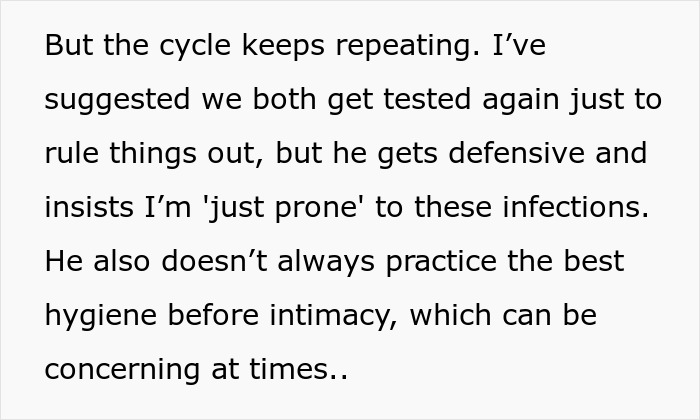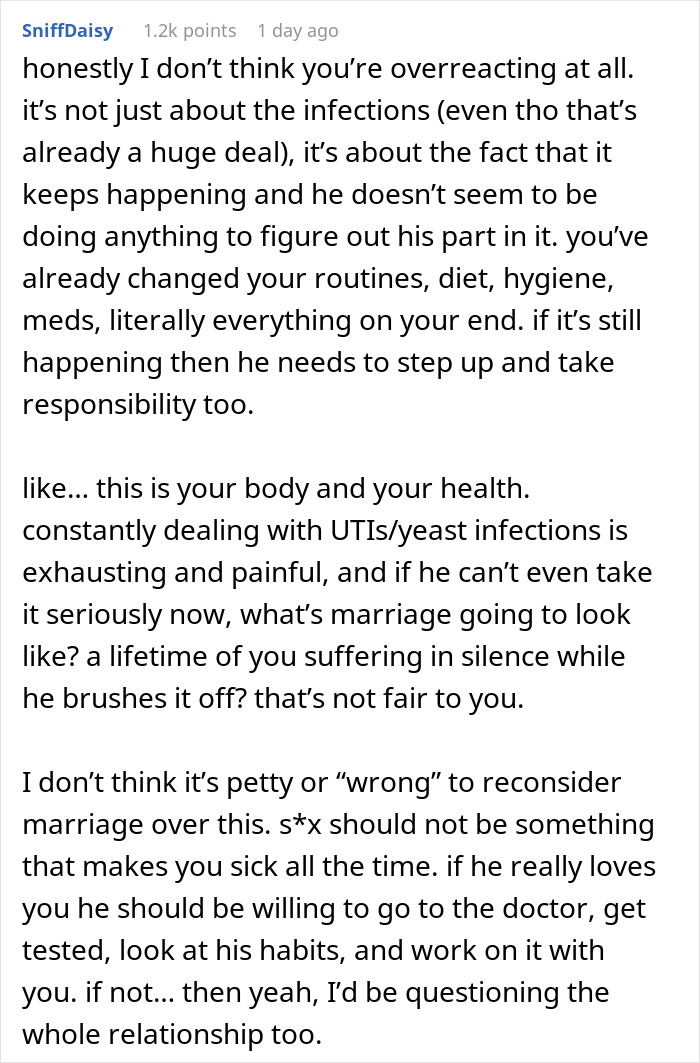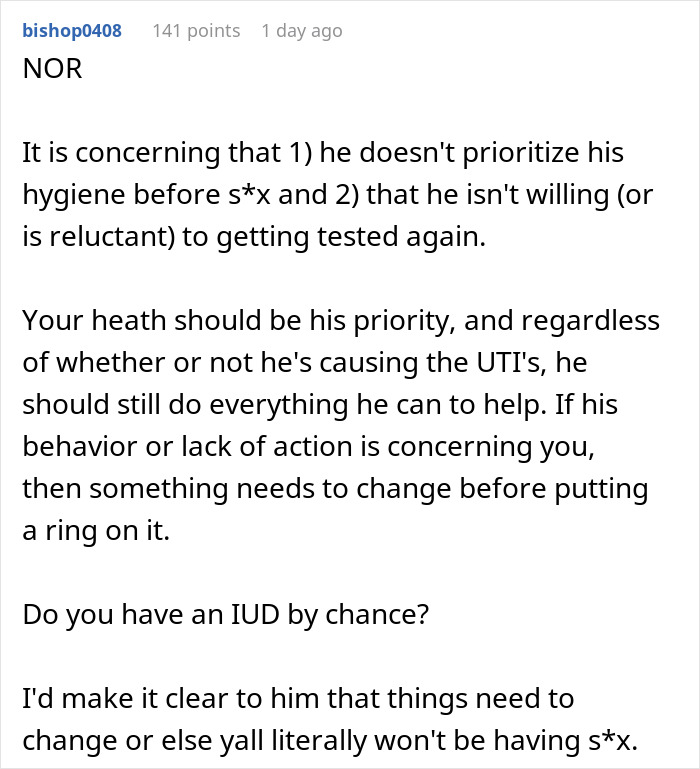Relationships can be full of little quirks like snoring, leaving socks everywhere, or talking through a movie. However, when your love life comes with a side order of antibiotics, things suddenly get a lot less rom-com and a lot more WebMD.
That’s exactly the awkward dilemma today’s Original Poster (OP) found herself in after three years with her boyfriend. What looked like a healthy, stable relationship on the outside came with a a cycle of painful infections that just won’t quit, but her partner’s dismissive reaction might be an even bigger red flag than the health issues themselves.
More info: Reddit
When you’re in a serious relationship, trust and teamwork are supposed to be the foundation, especially when it comes to health

Image credits: Szőcs Viola / Unsplash (not the actual photo)
The author has been in a three-year relationship with her supportive boyfriend and they’ve been discussing marriage



Image credits: lil_candy_

Image credits: Getty Images / Unsplash (not the actual photo)
Over the past few years, she’s suffered from recurring UTIs and yeast infections despite medication, hygiene routines, and lifestyle changes



Image credits: lil_candy_

Image credits: Getty Images / Unsplash (not the actual photo)
She suspects her boyfriend’s hygiene or possible untreated infection may play a role, but he dismisses her concerns and refuses further testing



Image credits: lil_candy_
The constant pain and lack of support leave her questioning not only her health, but also whether marriage with him is the right choice
At 29, the OP felt like she’d found the one. Her boyfriend was caring, supportive, and ready to talk marriage, and they had built the kind of foundation many couples dream of. However, it wasn’t until recurrent infections entered the picture that the cracks started to show.
Over some time, she began to face a relentless cycle of UTIs and yeast infections, and despite treatments, new hygiene routines, and even dietary changes, nothing seemed to stop the problem from returning. The more they returned, the more disturbed she became, so when the OP suggested that both of them get tested again, her boyfriend became defensive.
Instead of offering support, he insisted she was simply “prone” to these infections. She then noted that her boyfriend didn’t practice the best hygiene before intimacy, which was often a source of concern for her. She emphasized that she loved him, but the red flags were becoming too glaring.
What stung the most wasn’t just the health side, it was the lack of emotional support, so as intimacy grew harder, so did resentment. She then began to wonder if his lack of concern and carefree attitude towards her pain were red flags. She also questioned whether she must accept it as her problem and move on without him.
To better understand the recurring infections described in the OP’s story, Bored Panda spoke with OB/GYN Olabisi Olanrewaju, who explained that these issues are more common than many women realize. “UTIs usually stem from gut bacteria like E. coli entering the urinary tract, often after intercourse, incomplete bladder emptying, or urinary system issues,” she said.
Yeast infections, caused by Candida, can flare up after antibiotics, hormonal changes, diabetes, or shifts in the immune system. While partner hygiene or untreated infections can contribute, Olanrewaju noted, “they definitely contribute as bacteria and germs can be transmitted through close physical contact, including intercourse or through shared surfaces.”

Image credits: Getty Images / Unsplash (not the actual photo)
We asked what steps both partners can take when infections keep recurring, and Olanrewaju emphasized teamwork. “For women, maintaining hygiene, staying hydrated, urinating after intercourse, and following treatment plans is essential. Partners should also be checked for hidden infections and treated if needed,” she explained.
She added that avoiding irritating products, using protection if recommended, and openly communicating about symptoms and timing around intimacy can all help reduce flare-ups. “Ultimately, it’s about reducing triggers and keeping infections from recurring,” she said.
Many people also wonder what to do if a partner is dismissive or reluctant to take preventative measures, and Olanrewaju stressed the importance of advocating for yourself while staying constructive. “Focus on your own prevention and treatment,” she advised, “and educate your partner calmly about how infections work by framing it as a team effort to reduce defensiveness.”
If the partner remains resistant, she advised being wary and also suggested that doctors can offer guidance or preventive treatments that don’t require partner participation. Most importantly, she noted, “Prioritize your well-being. Recurrent infections aren’t just uncomfortable, they can have long-term health impacts if left unmanaged.”
Netizens expressed concern that the recurring infections are not just a medical issue but a relationship red flag. They emphasized that a partner should take responsibility and support their significant other through health challenges. They also highlighted that hygiene and willingness to get tested are essential, noting that ignoring these steps could lead to long-term problems.
What do you think about this situation? Do you think ignoring a partner’s health concerns is a dealbreaker for marriage? We would love to know your thoughts!
Netizens insisted that this is indeed a red flag, and that until the author’s boyfriend gets tested too, they’re both wasting their time




















 Follow Us
Follow Us





